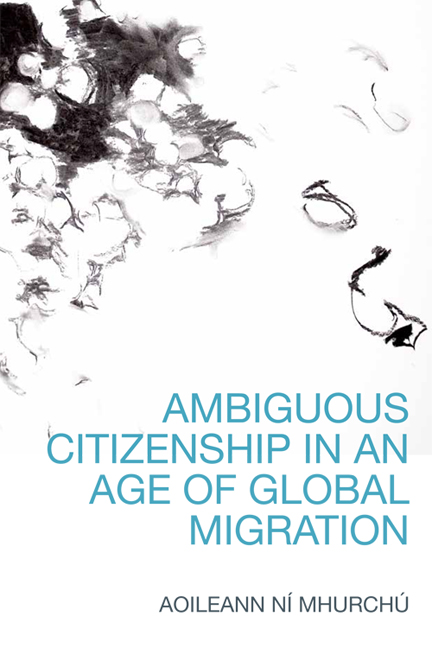Book contents
- Frontmatter
- Contents
- Acknowledgements
- Abbreviations
- Translations
- Introduction
- 1 Exploring the Citizenship Debate: The Sovereign Citizen-Subject
- 2 A Lens: The 2004 Irish Citizenship Referendum
- 3 Trapped in the Citizenship Debate: Sovereign Time and Space
- 4 Interrogating Sovereign Politics: An Alternative Citizen-Subject
- 5 Challenging the Citizenship Debate: Beyond State Sovereign Time and Space
- 6 Traces Rather than Spaces of Citizenship: Retheorising the Politics of Citizenship
- Conclusion
- Bibliography
- Index
3 - Trapped in the Citizenship Debate: Sovereign Time and Space
- Frontmatter
- Contents
- Acknowledgements
- Abbreviations
- Translations
- Introduction
- 1 Exploring the Citizenship Debate: The Sovereign Citizen-Subject
- 2 A Lens: The 2004 Irish Citizenship Referendum
- 3 Trapped in the Citizenship Debate: Sovereign Time and Space
- 4 Interrogating Sovereign Politics: An Alternative Citizen-Subject
- 5 Challenging the Citizenship Debate: Beyond State Sovereign Time and Space
- 6 Traces Rather than Spaces of Citizenship: Retheorising the Politics of Citizenship
- Conclusion
- Bibliography
- Index
Summary
The counter-arguments in the debates surrounding the 2004 Citizenship Referendum which embody critical interrogation of the proposal have attempted to rethink citizenship anew. I look in this chapter at how these converged around (rather than necessarily falling neatly into) two forms of analysis which reflect the broad terms of the inclusivist citizenship model outlined in Chapter 1. The first form is a gendered analysis which points to and attempts to think in post-statist terms beyond the racialised nature of the discourse surrounding the act of childbearing by so-called non-national women (in particular, asylum seekers). The second is a human rights analysis which considers how the exclusionary link between residency and reproductive rights can be redrawn more inclusively through trans-statist cosmopolitan and humanitarian concerns.
Discussing these two approaches, this chapter looks at how exactly the universal inclusivist citizenship model tries but ultimately fails to rethink citizenship outside the terms of the Citizenship Debate, remaining instead trapped within these terms. It considers how the two forms of analysis argue in favour of the need to widen the understanding of who can be recognised as citizens to include migrant mothers and their children, as well as other types of migrants more generally. Such analyses widen the scope of existing sovereign territorial dualisms but without thinking about time and space beyond sovereign dualistic politics – that is, beyond linear time and absolute space. They therefore continue to reinforce an understating of subjectivity in terms of the idea of a coherent bounded ‘I’ (as woman, child, migrant, human and marginalised) which can continue to be temporally and spatially differentiated from the ‘Other’ (the citizen, the included, non-marginalised).
The Gendered Analysis
The referendum campaign was conducted using gendered, racialised discourses of blame against migrant women who were allegedly having babies solely to gain Irish citizenship for their children
One of the main oppositions to the Irish government's proposal to amend automatic entitlement to citizenship at birth is a gendered critique of the perceived threat which certain people were supposedly posing to the integrity of Irish and European citizenship law in the early twenty-first century.
- Type
- Chapter
- Information
- Ambiguous Citizenship in an Age of Global Migration , pp. 96 - 131Publisher: Edinburgh University PressPrint publication year: 2014



